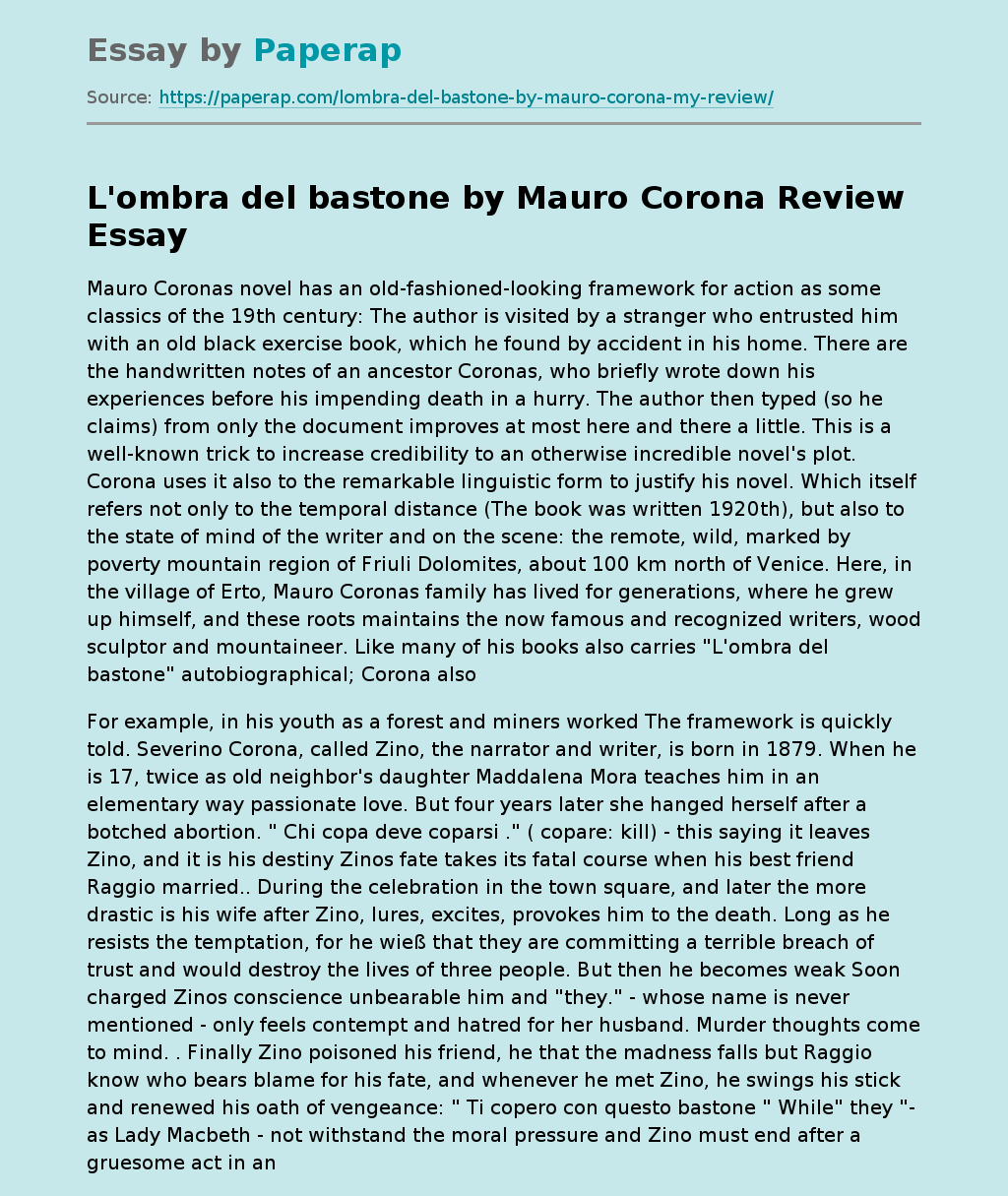L'ombra del Bastone by Mauro Corona Review
Mauro Coronas novel has an old-fashioned-looking framework for action as some classics of the 19th century: The author is visited by a stranger who entrusted him with an old black exercise book, which he found by accident in his home. There are the handwritten notes of an ancestor Coronas, who briefly wrote down his experiences before his impending death in a hurry. The author then typed (so he claims) from only the document improves at most here and there a little.
This is a well-known trick to increase credibility to an otherwise incredible novel’s plot. Corona uses it also to the remarkable linguistic form to justify his novel. Which itself refers not only to the temporal distance (The book was written 1920th), but also to the state of mind of the writer and on the scene: the remote, wild, marked by poverty mountain region of Friuli Dolomites, about 100 km north of Venice. Here, in the village of Erto, Mauro Coronas family has lived for generations, where he grew up himself, and these roots maintains the now famous and recognized writers, wood sculptor and mountaineer.
Like many of his books also carries “L’ombra del bastone” autobiographical.
For example, in his youth as a forest and miners worked The framework is quickly told. Severino Corona, called Zino, the narrator and writer, is born in 1879. When he is 17, twice as old neighbor’s daughter Maddalena Mora teaches him in an elementary way passionate love. But four years later she hanged herself after a botched abortion.
” Chi copa deve coparsi .” ( copare: kill) – this saying it leaves Zino, and it is his destiny Zinos fate takes its fatal course when his best friend Raggio married.. During the celebration in the town square, and later the more drastic is his wife after Zino, lures, excites, provokes him to the death. Long as he resists the temptation, for he wieß that they are committing a terrible breach of trust and would destroy the lives of three people. But then he becomes weak Soon charged Zinos conscience unbearable him and “they.” – whose name is never mentioned – only feels contempt and hatred for her husband. Murder thoughts come to mind. Finally Zino poisoned his friend, he that the madness falls but Raggio know who bears blame for his fate, and whenever he met Zino, he swings his stick and renewed his oath of vengeance: ” Ti copero con questo bastone ” While” they “- as Lady Macbeth – not withstand the moral pressure and Zino must end after a gruesome act in an asylum, with the shadows of his past life, the burden him constantly and threaten – and l’ombra del bastone of Raggio is its symbol. Neither the deadly showdown still a new life it can bring salvation.
All this writing Zino itself quickly into the black book, driven by his how he knows impending death. We learn a lot about the way the rough, pitiless mountains and how they demanded the residents for generations, shaped and deformed. Good and bad people are exposed to unpredictable Schicksalsschägen; any error, any uncontrolled passion demands a price. Explanations, comfort and hope, the promise Bergler in the irrational; Superstition and fear of God, witches and ghosts, the demonic nature determine thinking and acting. justice is made in these circumstances most easily by revenge. Just as nature takes its revenge inevitable, practicing murdered beyond death cruel retaliation; the consequential way out is: “. Chi copa deve coparsi”
The reading pleasure is somewhat clouded by the artificial-looking narrative. The frame story with the black booklet may well convey the authenticity, but that is Corona is also one that he has to speak like Zino. Then lined sometimes quite insistently the ominous advance references; announcements of events that are later filled with details a few pages; . The return references to just-reported
The narrative structure is generally chronological, detailed but somewhat erratic-associative: dates, age, name dropping like diced so that the reader order and perspective needs to create itself. Bad it’s not, but would produce instead of a kind of ostensibly simple mountain diary the author so calm something can give structuring expertise his ancestor more – because formulate and can reflect the already very good. This talent, it is thanks to them that we will be conflict of conscience, his internal struggle to resist the various temptations and to defend its moral position under the skin.
P.S.. – Supplement in November 2012: To mark the publication of the German translation of this book I have revised this review and clarify Lesen here my review of Mauro Corona:’Im valley of Vajont’ on books Rezensionen”
L'ombra del Bastone by Mauro Corona Review. (2019, Nov 18). Retrieved from https://paperap.com/lombra-del-bastone-by-mauro-corona-my-review/

